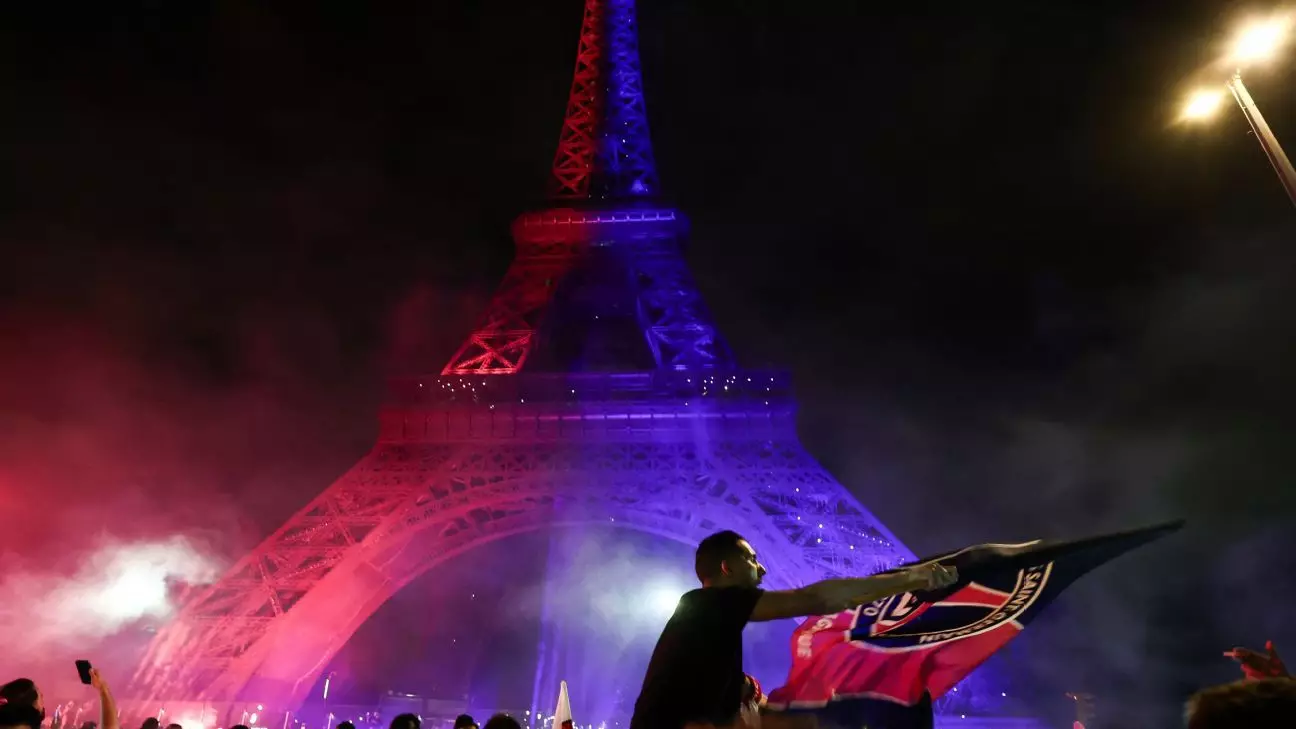What should have been an electrifying tribute to Paris Saint-Germain’s significant leap into football history instead became tainted by violence and tragedy. On what began as a jubilant night of festivity following PSG’s long-anticipated Champions League victory, two fans lost their lives, and a police officer was left in critical condition. The glaring contrasts between jubilant celebration and horrifying chaos expose a crack in the society of sports where jubilation often flirts dangerously with reckless abandon.
Fans flooded the streets, filling them with passion, pride, and an overwhelming sense of victory. The Eiffel Tower was spectacularly adorned in PSG’s colors, illuminating the night sky with the promise of hope and unity that sports can ignite in communities. However, the joyful chorus quickly dissolved into a cacophony of violence and destruction, highlighting a troubling element within fan culture.
From Euphoria to Despair
The fatalities that marred this particular occasion are not just numbers; they represent the heart-wrenching reality that shadows many communal sport celebrations. The deaths of a teenager in Dax and a young man in Paris reverberate beyond what they experienced; they resonate with families and friends who now face unimaginable loss over a moment that was supposed to be celebratory. Football, often celebrated as the world’s greatest unifier, tragically became a backdrop for unavoidable violence. The easy connection manufacturers make between organized fandom and unrestrained chaos often ignores the profound societal issues permeating football culture.
Furthermore, the injuries sustained during the festivities are not merely unfortunate outcomes; they point to a failure in crowd control and public safety. The Paris police force’s response—though portrayed as decisive—raises questions about preparedness. Employing tear gas and water cannons suggests a reactive rather than proactive approach, suggesting a gap in strategies for managing such enormous crowds. The chaotic scenes, found in the very heart of Paris, bring to light the systemic concerns that permeate not only football culture but the broader context of public safety during massive gatherings.
Exuberance and Lawlessness Side by Side
Conflict struck as exuberance mingled with lawlessness. Focusing on the Parisian streets teeming with exuberance, we cannot ignore the realities playing out amid the revelry. Reports of looting and vandalism—294 arrests and broken windows in the Champs-Élysées—suggest a troubling undercurrent to what was supposed to be a night of glory. While one may argue that these acts of vandalism were perpetrated by a small minority intent on disruption, the surge in negative behavior begs reflection on a growing disconnection among dedicated fans and those seeking chaos under the guise of celebration.
Laurent Nunez, the Paris police chief, blamed the unrest on a faction of revelers who came not to celebrate the beautiful game but to disseminate disorder. Yet, one wonders if such citations could be an oversimplification of a deeper malaise in society. Why do large celebrations often yield a sizeable portion of disorder? Is it an inherent flaw in spectator society, or does it point to underlying issues that must be examined and addressed?
Football’s Dual Nature
As we bask in the light of PSG’s monumental achievement, we must grapple with the shadow it cast on a community wide-rooted in love for the game. Football is a double-edged sword—it has the potential to unite individuals, yet it equally has the capacity to incite and divide. This duality reflects broader societal issues, including youth disenchantment, the agency of public spaces, and the social contract that governs collective behaviors.
Sporting events hold an unparalleled power to create communal identities, but this power comes with great responsibility. Reflecting on these chaotic instances, clubs and authorities must ask themselves: how do we harness that power for good? Can the footballing spirit be guided into more productive, safe environments?
The dialogue about public safety, crowd management, and fan behavior must extend beyond superficial measures and delve into the socio-cultural frameworks that inform them. PSG’s victory should be a starting point for conversations around building a culture of responsible celebration, rather than merely discussing the chaos that can ensue.


Leave a Reply